| |||
| count of count | |||
| aquarium | |||
| no f |

A long day turns into night (Part 2)
5:15pm I'm greeting a toothless grandma: „Jarama“, she's greeting back „Jarama“. A bit off the road one can see a few small, poor looking huts. 5:26pm Cigarette advertising sign? Cigarette advertising sign. What would this world be without cigarette advertisement. After that I pass through a couple of villages, I ask if I'm still on the right track. 6:02pm The road ends at a gate, behind it there's a village. A gated comunity? What shall I do? A man who happens to pass by gives me an explanation that I don't understand - and opens the gate for me. He knows that on my way to the border I will have to cross a river and later on will have to turn left at a junction. 6:24pm For the last time today I can read my speedometer: still 4 kilometers to go until Mali. It gets dark, really dark. There's an omnivorous blackness, not even the moon is shining. The starry sky is magnificent, but I have no eye for it. When I'm pushing my bike through a grove I hear a suspicious noise behind me. I turn around, a black shadow is creeping onto the path. A damn huge pussy-cat. A too big cat. Green eyes are lurking in the darkness. Their flashing look doesn't inspire my confidence and the cat seems to get bigger and bigger. I yell in a terrifying way and slap my palm on the saddle. Whatever it is, it is scared and flees back into the wood. From now on I'm even more on the alert while pushing my bike. There's nowhere a light to be seen. I should have already seen any lights shining over from Mali. Instead of that the road is still a grim up and down. Being on the bike again I'm crossing a small creek. Afterwards the chain drive grinds severely. In the darkness I cannot figure out the cause and knock against the mudguard. Gravel crumbles off, but the awkward grind doesn't disappear again. With my headlamp switched on I check the speedometer. I've already covered more than 8 kilometers since I've left the village. And there's still nothing else than darkness and scree. In the meantime I don't feel strong enough anymore to curse. I'm asking everybody who comes along for Mali. Just keep going on. „C'est loin?““Pas loin““Mais c'est loin“. Some time later somebody says it would only be 2 more kilometers until Mali. Because lots of boulders and scree I have stopped cycling for quite a while. I can hardly see the road anymore. It seems to get wider and wider, 50 meters, 100 meters, a gigantic area of scree. A moonscape, but even the moon is hiding. Am I still on track? The only help for orientation provides the dimmed light of my electric torches. But where are the bright lights of Mali? On and on I'm dragging myself across the scree. There's simply no alternative. Then I discover a couple of lights that are not far away anymore. Unnoticed I have reached a hilltop and now can see the first glimmer of light of my destination. This eventually is the end of the by far hardest day of my journey.
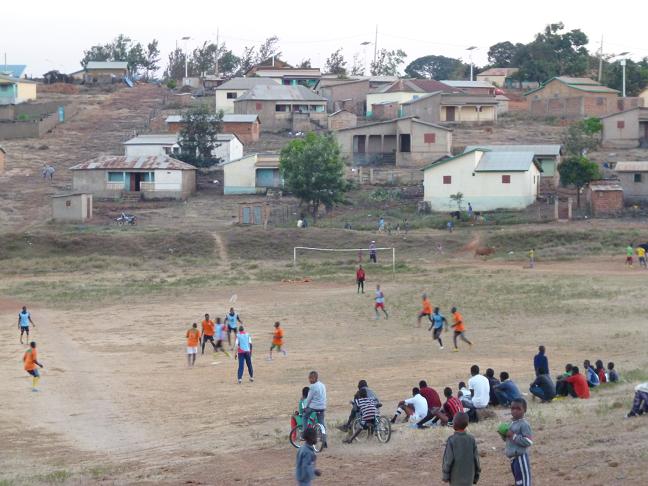
Football match at Mali-Yemberem, deflection of crossbar is not according to Fifa-standards
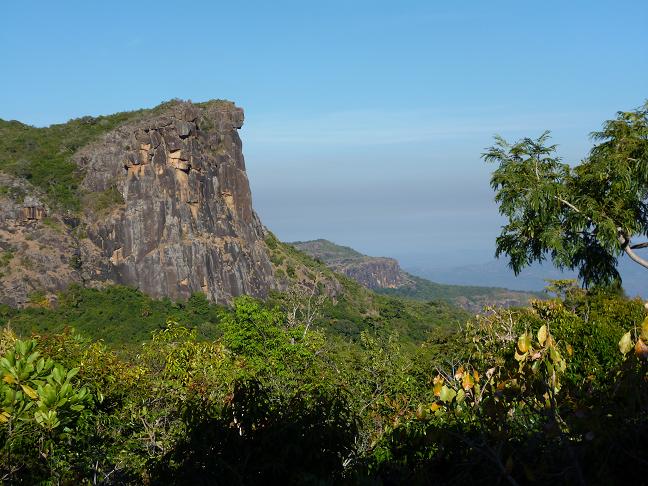
Mountain "La Dame de Mali"
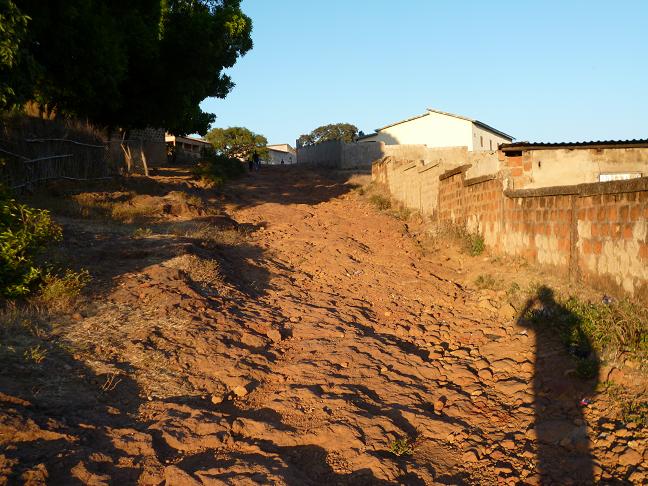
Typical street in Mali-Yemberem
22.03.2013 - translated by NN
A long day turns into night (Part 1)
It follows a very shortened report of these day. For the upcoming track section from Segou in Senegal to Mali Yemberem, a remote mountain village in the Fouta Djalon range in Guinea, I got a lot of various information. It will emphasise that no one of them is totally correct. The people from Senegal recommended me the direct way which cannot managed by vehicles and on it’s end you have to go by feet a very steep cliff upwards. If I could carry my bike on my head??? A pretty easy exercise but I denyed. There should be some Sherpa at the edge of the cliff which could carry my bike and the rest of my stuff for money. Why not? With my rudimental French I also understand something about a long ladder which I have to climb up and something of an profoud abyss without an railing where I have to balance along. But only with the bike on my head….For what am I in Africa? If not for a little adventure like this? I start early at seven, shortly after the beginning of brightness. The “street” to the border does not exist, instead of the street I found a small aisle in the vegetation with a scree field and a very tight ascending trail. Not to think about cycling. While I’m swearing I heave my bike uphill. Many parts are so steep that I push the limits of possibility. For the first 1,5 km I need nearly one hour. Going by feet would have been quicker. After twelve kilometers I reach an over the road tightened string and an village that consists entirely of bamboo. Where is the border guard? An elongated scales turns out to be the border guard. The door and all the furniture inside are complete out of bamboo, otherwise the shed is empty. The officer in preppy uniform has an exercise book, which he has stolen from his daughter, where he wrote, assisted by his assistand, the details of my passport down. The good mooded man is asking this and that and when I told him my next destination Bamako in Mali, he exclaims: "A la guerre!" The boss of my accommodation has been inculcated that I just had to take a side road in Lougue and should not longer follow the main road. Therefor I wrote the villages down which I had to pass. This is similar confirmed by Guineans. A boy is brings me to the beginning of the path. I only had to follow the path, always straight away. I know this “always straight away” very well, it applies only to the first junction and this junction is certainly. Sometime a motorbike came towards me, no off road bike only a normal road model. The driver told me he started one hour ago from Mali-Yemberem. The route wouldn’t be easy but possible with the bike. Behind a village I should turn right. I draw a lot of hope to reach my goal before darkness. Suddenly it’s going steep downhill on a scree slope, I’m bouncing like a fawn. Something is wrong with my bike, It’s not calibrated correct. I look around, the left luggage bag is missing. With pain I stop the vehicle on the scree slope and go back by feet. Less than hundres meter away I find my bab. Lucky me. But the middle protection of the mount was totally destroyed and one of the main suports were badly damaged. For a while it’s going down and up the hill til I finally reach the mountain. It was terrible. Scree slopes at the limit of possibility. Every 10m I have to take a break, sometimes already after 5m.
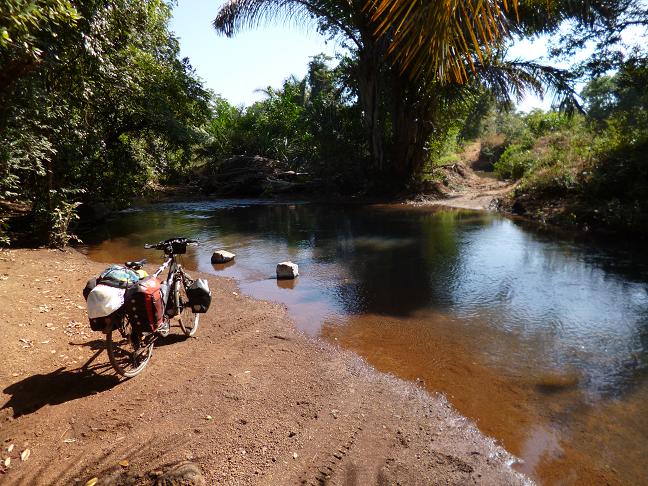
river crossing
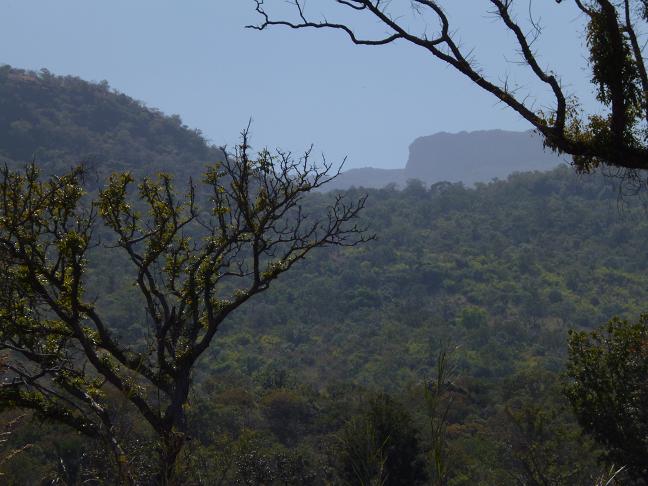
destination Mali-Yemberem still far away
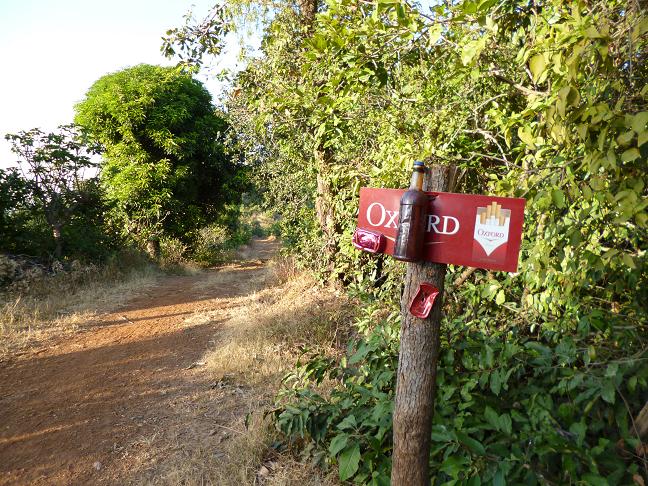
advertisement for cigarettes
20.03.2013 - translated by Diana
die 10 touristischen höhepunkte senegals
- phantastic nature in the Sine-Saloum-Delta
- Cafe Touba, it tastes like herbal water in a finish sauna
- trinity of scrap place, local workshop and bus terminal in Kaolack
- wild Party in the Mission Catholique in Kaolack, although a paper pinned on the door declares it a place of quieteness and contemplation
- Le Brasero, french restaurant, which is like an oasis in Kaolack
- Gazelle avec citron while watching the Gambia river
- my host family in Dialakoto. Many thanks for the hospitality and the delicious food
- bird watching at the Gambia river in Kedougou
- snuffling and grunting of the Hippos in the Gambia river in Mako
- idyllic landscape around Segou
13.03.2013
southeast senegal
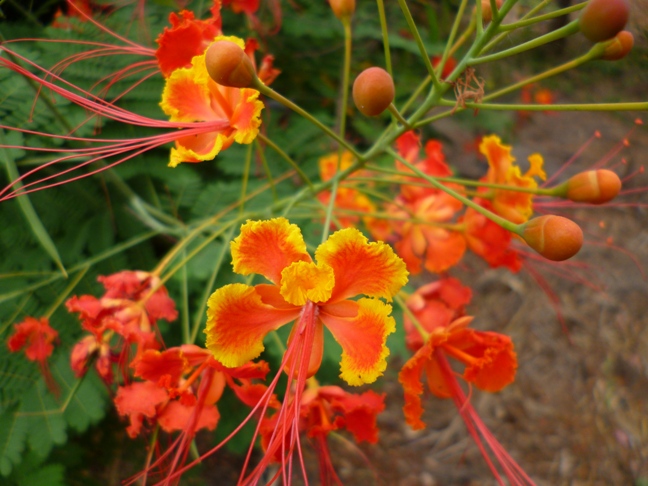
flowers in Mako
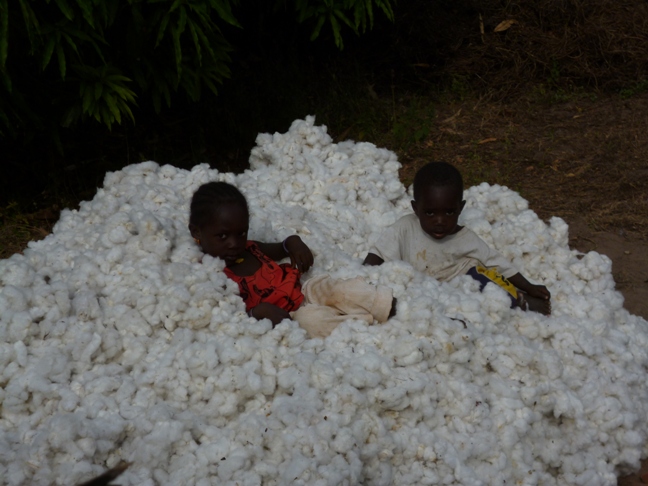
surprising winter inSegou, the children are sceptical
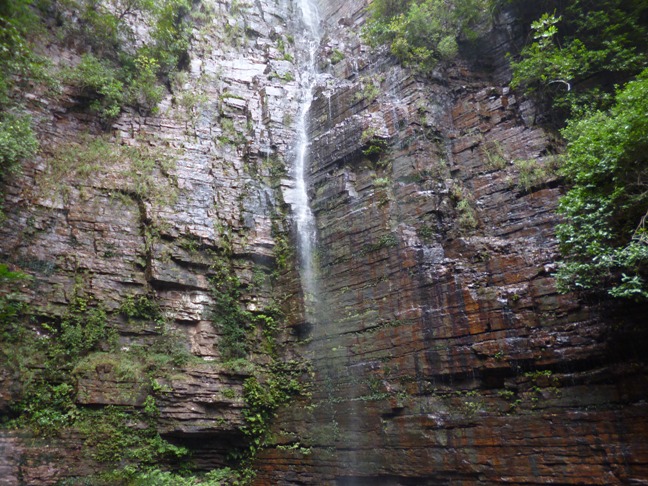
waterfall in Dindefelo is more like dripping water on the rocks
13.03.2013
Attention – sleeping lions
Kedougou is in the extreme south east fo senegal. To come from Tambacounda to Kedougou I had to
cross the Niokolo-Koba national park. This park is pretended as the biggest still existing wilderness
in western africa. It is forbidden to explore the park without a car, but the main national road RN7
goes directly through the park and I had the information that it is allowed to cross the park by bike
on this main road. However there is no accomodation or any other infrastructure along this road or
on any other place in the park, so I had to do the 120 km on one day by bike. Furthermore I had
heared that sometimes lions sleep in the middle of the road. On the other hand I also had heared
that tourists do not see more or less wild animals in the park than I had already seen during
crossing the country by bike, which are wild groups of monkeys. On the daybreak I started cycling
and I did not notice that I left Dar Salam, which is the official entry to the park. The low
temperature on the beginning of the day made me a little be cold because I weared only a short-sleeved
bike dress. The first seven kilometers go along the border of the park till the last village
Dienoundiala. Then the road goes directly through park. In Dienoundiala I would like to have
breakfast. I had a baguette with choco-peanut cream but because it was so eraly in the morning
no coffee was available. So a man went quickly home because he would like to boil water for
the coffee. Unfortunately I attract more attention as I would like to have because a smart-alecky
man advised me that it is not allowed to cross the national park on the bike. So I disabused him
that it is allowed to go by bike through the park if I would stay on the main road RN7. Hereon
he said that it is very dangerous because of the lions and that in this case I have to go to the
next military post, which is 1 km away, because I have to sign a declaration that I act on my
own risk. I just asked me if a lion knows about this declaration and if the lion get indigestion
because of this declaration?
Because it was really early in the morning the military post is unstaffed and so I quickly passed
it. After that pure wilderness, my bike and me. I nervously observed the savanna on the right and
on the left side of the road. The high grass would be a fantastic hiding place and I thought by
myself that “Toubabs” surely would be a delicacy for lions. So I started to sing in a loud but
not very nice way, because I was sure that noise would shock any cat regardless of its size.
Suddenly there was a big horde of monkeys in front of me. But it is always the same: first the
monkeys do not notice me because the bike makes no noise but then they do and they are up and
leave to the wilderness. So I had no possibility to take a foto because they are too fast or
I am too slow. Nearly every 15 minutes a vehicle passed me. At 9 o’clock it begun that big
lorries were rumbling through the park. Normaly there are more than 100 of such trucks every
day, which drive through the park on their way from Mali. I wonder, if the lions could sleep
well in spite of the noise made by these trucks. I still kept my eyes on the right an the left
side of the road. This day was really perfect to cycle such a long distance because it was a
little bit cloudy and not too hot. Suddenly I heared a strange noise comming from the wood.
The noise did not seem to be done by monkeys. I begun to cry but the animals did not piss off.
I asked me what it could be? Frightened I reduced the speed, but I was to close so I wasn’t
able to turn off. Then I noticed two animals in the bush, which looked like a kind of wild pig.
These two observed me nosey. I did not dare to stop for foto, so I carefully went further. Two
more times I noticed animals far away. Bu I was not able to identify them. They could be black
panthers or grey wolfes, whether these species do not exist in the park. On the early afternoon
I arrived safely and relieved at the other side of the park.
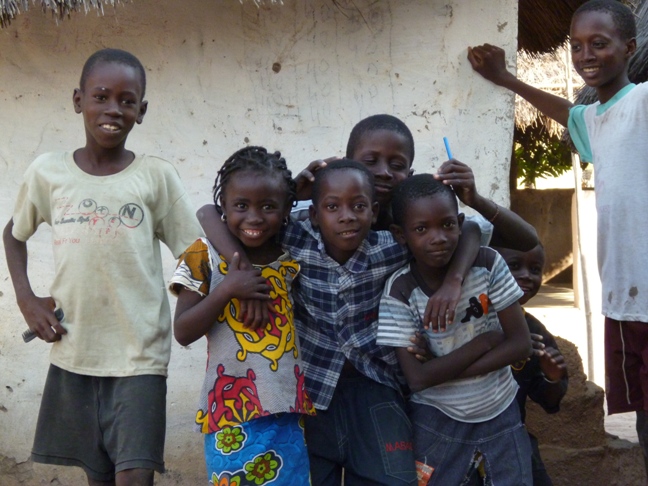
Curious children in Dialakoto
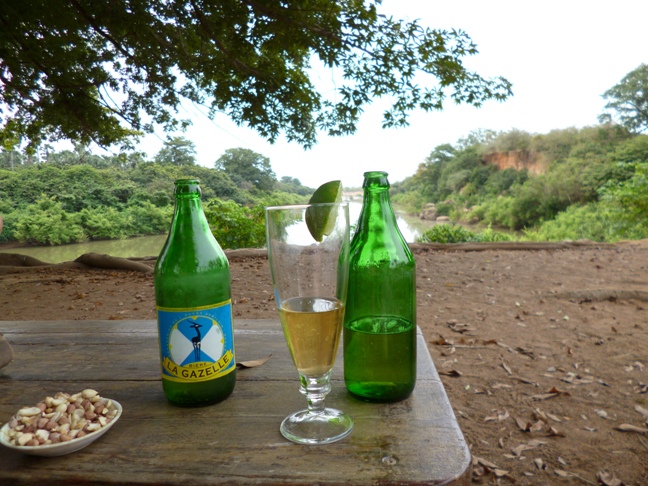
View of Gambia river
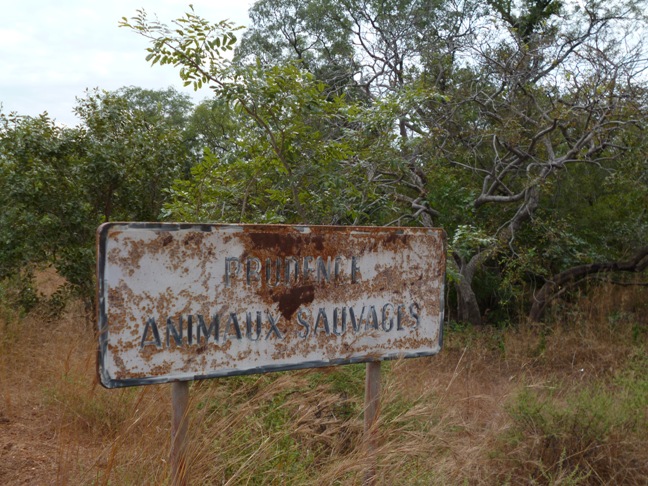
Attention lions
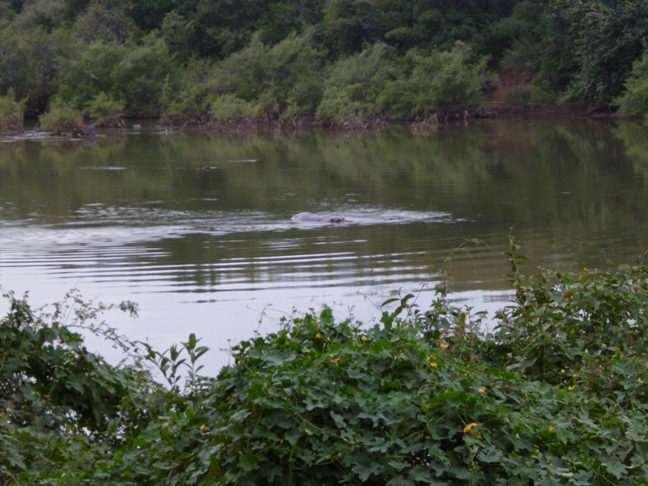
Search the hippo in the Gambia river. It is hiding well.
24.02.2013 - translated by Jörg
the 10 touristic highlights of the gambias
- boat trip on the Gambia river with phantastic jungle along the shores
- Feel the vibes. This is little Jamaica
- Making friendship with a policeman
- Being paddled in a canoe from JangJang Bureh (camp) to JangJang Bureh (town)
- ATM-Roulette: Insert your card please!
- horde of monkeys at JangJang Bureh Camp
- Eating the African way: Everybody eats together out of one big bowl. You can use your hands
- Wreck diving in front of JangJang Bureh Camp
- Listening to the jungle music at JangJang Bureh Camp
- My host family in Fatoto. Many thanks to Amadou and his family for their hospitality
11.02.2013
without a clou and without uniform
On maze-like trails I reached the small village Nyamara in the outmost east of Gambia. There I asked the way twice, was sent zigzaging through town and eventually came to the border station which was placed along the roadside. A couple of men, 2 of them wearing uniforms, were resting beneath a sunshade. According to the local customs I cycled to them, said hello and did some small talk. Just when I wanted to address to the uniformed guys one of the others, wearing a white and red T-shirt and brown trousers, wanted to check my passport. It turned out that he was the chief of the border station. He browsed through the pages of my passport and was irritated, because he couldn't find a Gambian stamp among all the Chinese visas and other stamps. Eventually he spotted my last departure stamp. „You already left the country. This is a problem!“ I explained my itinerary to him and also pointed out to the right arrival stamp, but that didn't calm the mood of the chief without uniform. Far from it! He grunted at me „You are going in and out of Gambia. So what is your problem?“ „Um...“ What should I respond? Then I somehow managed to get the swerving truck back on track again and got the departure stamp. Behind the non-existing boom a dirt road in extrem poor condition was commencing. I could tell by the traces that it was only frequented seldom by motorized vehicles. Instead of leading to the Senegalese border station the dirt road suddenly merged with a sealed road. I was in Senegal. But where was the border station? Two women who were living at the junction were not so lucky. I got on their nerves until I got the answer that I had to turn left which was the same direction I had planned to go. After 2 kilometers I spotted the well camouflaged border guard and the rest was a breeze.
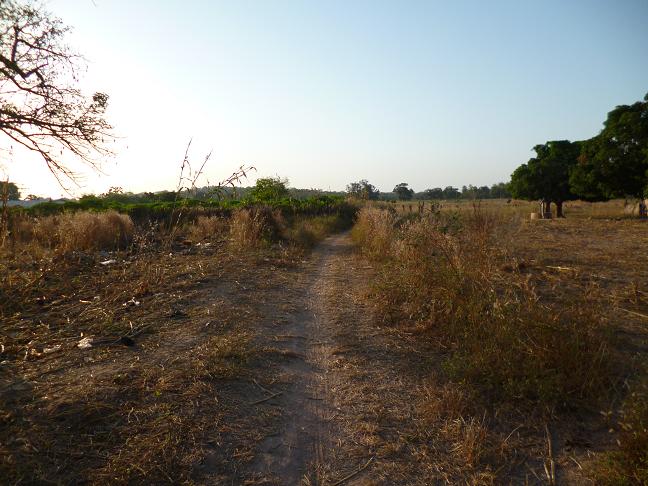
This way to the border?
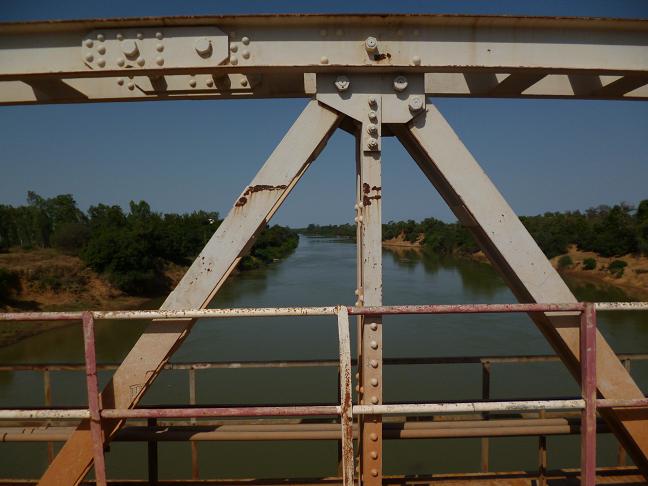
bridge crossing Gambia river (classical steel structure)
08.02.2013 - translated by NN
in eastern direction
In JangJang I crossed the Gambia River, because the really excellent bituminised road eneded on the northern side at the pier for the ferries. The road, which runs on the southern side of the river was in quite similar good condition, at least so far as I reached Basse Santa Su, which is the biggest city of Gambia outside of the coastal region. Because of this I hoped that the infrastructure is quite well there. But this hope was deeply disappointed. The good condition of the road ended at the street sign of the city (by the way the street sign of the city was not existing). From there on the main street (which was the lonely existing main street) consisted of bituminised patches on red soil. The accommodation, which was recommended by the guidebook did not exist any more. So I asked me what I should do now. I decided to ask the locals. At the end of the day a man brought me to building far away from the main street, which should be the best hotel of the city (at least the local said that it is). The hotel neither had a name nor a sign. The condition of the hotel was not really clear. I asked me if the building is still under construction or if the building is broken down or if it is renovated at the moment. Because I was not sure I discreetly asked the local about the desperate condition of the building. He only answered to me: “ Problem, problem.” The president has enacted a new law. A hotel has to be looked like a hotel. So in the staircase and in the floors either many buckets filled with paint or building waste were collected. Also in Gambia counts: constructional defects can be cleared with lots of fresh paint. You can say that Gambia ends in Basse, but in my map I found another village, which is about one daily trip (by bike) eastwards from Basse. So I cycled eastwards on a dusty road. I was really surprised because I moved forward very well. The only thing was: whenever a car passed me, I got completely dusty. When I arrived at lunch time in the place called Fatoto, I had to notice that it is not more than a very small african village. Normaly Toubab did not visit this village, so it was clear that no accomodation was available there. And this time the police was not useful for me, so I cycled through the village without knowing where I can go. At any time I reached the Gambia river. There some men were relaxing in the shade. I drunk a tea with them and then a boatsman offered me to stay at him over night. His name was Amadou. Of course he and his family welcomed me and they also supplied me with lots of african food.
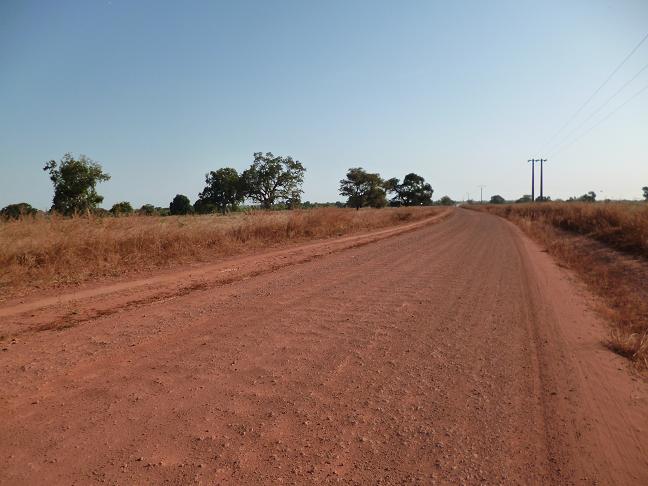
classical dusty road
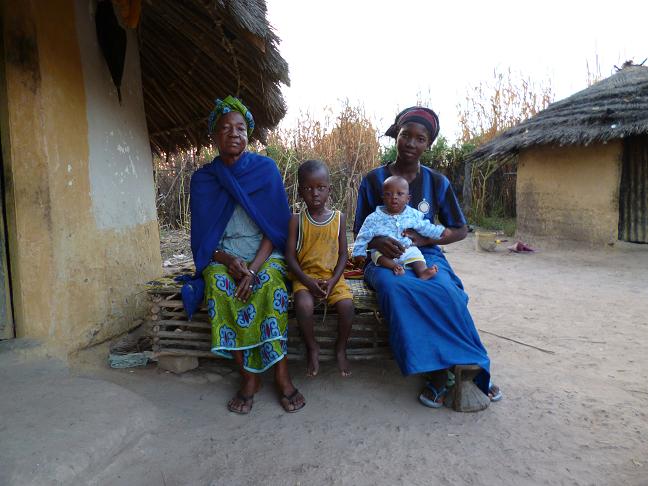
host family in Fatoto
03.02.2013 - translated by Jörg
horde of monkeys
Another day on the bike and I was in JangJang Bureh, a town which fell into sleep after the colonial time had ended. Not the town itself is of interest but the namesake JangJang Bureh camp which according to some rumours belongs a German guy but the real owners of the Camp are the monkeys. They jump around everywhere, hang around in the trees, struggle like children, are chasing each other and steal the food of everybody who looks away just a second. I spent five days at this phantastic place including a boat trip on the Gambia river.
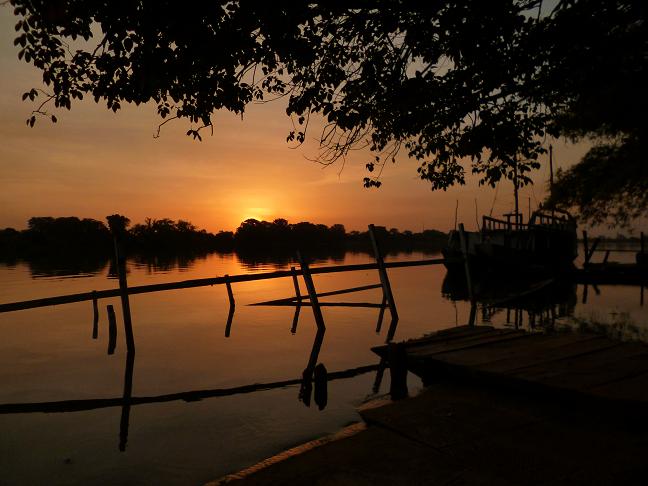
evening at the Gambia river
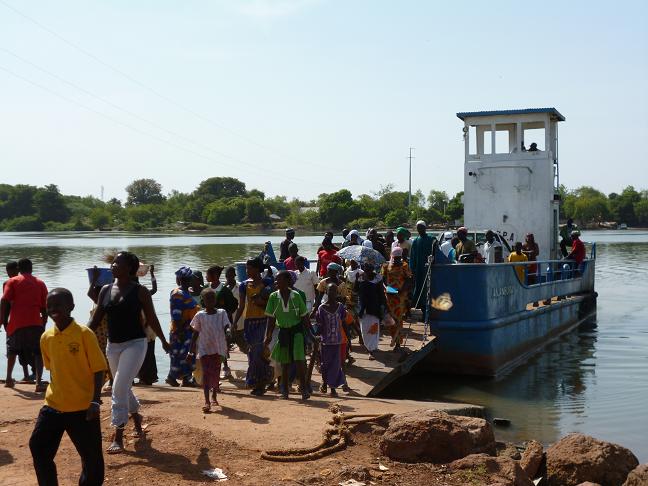
ferry across the Gambia river
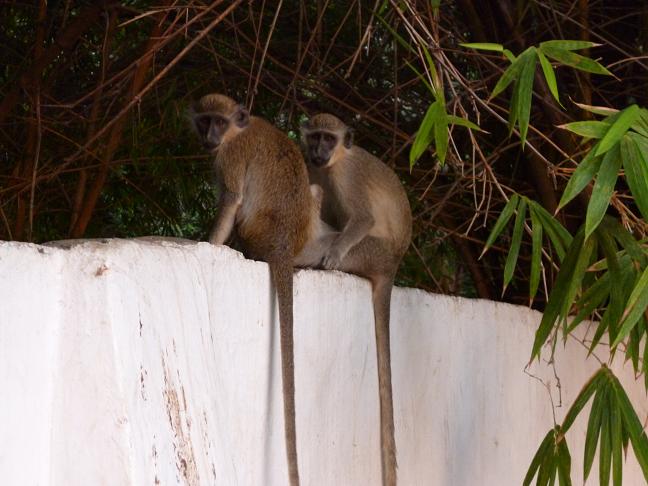
No, we don't steal any food. Never!
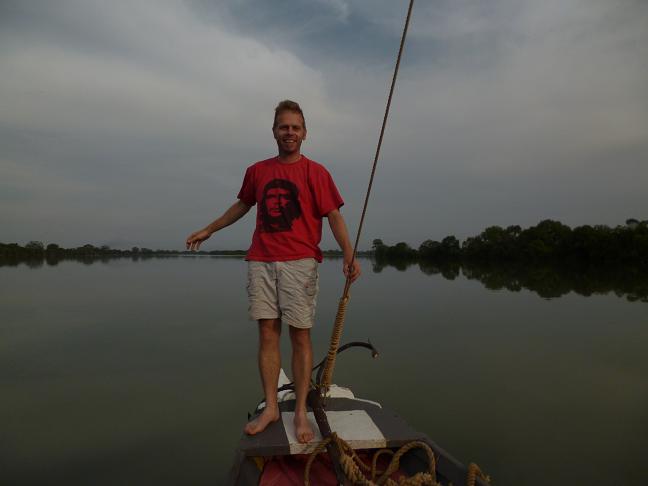
...Yo no soy marinero...
23.01.2013
at the police station
From now on I was riding my bike along the northern shore of the Gambia-river, without
seeing it directly.
The road was in perfect condition and about no motorized traffic. Small villages where
kids were calling enthusiastically “Toubab, Toubab” (Caucasian) towards myself and monkeys
are jumping across the road sometimes.
An idyll and however it happened not only once that I spent not only an afternoon but
also the night at a police station. Every district in Gambia has its own police station
and this one is always located at a main road.
Every passing vehicle will be checked and this no walk in the park for Gambians.
Often I will be stopped on my bicycle but only for making friends spontaneously.
My path planning had resulted in that the next bigger city will be too far away
for a stage and that’s why I have to spend the night somewhere. On my map the
only town about halfway is called Njau.
Okay now Njau.
Short time after noon I am rolling in the police station of Njau. Contrary to my
previous experiences I am ignored completely. No one wants to make friends with me.
But I want to know where I can spend the night. After the exchange of some sensitivities
(what I had initiated experienced in African), I found out that there is no possibility
to spend the night in the town.
I announce that I am having a tent and I am willing to use is. The policemen are
discussing in Mandinkan.
Finally one of them is offering me his room while his 24-hour service.
I agree and I am guided to the house in the town that consists of two separate rooms
and each room is having two doors (front and rear) up into the open air. Next door one
colleagues is living. The room is clean and tidy with a wide bed.
The roofless bathroom with a bucket shower is located outdoor in a palm frond shed at
the back of the house.
Unfortunately the toilet of the district was broken. The next one was 500 meters away
at the police station.
After parking my bike and bags in the room I returned to the police station where I
spent the rest of the day. I am invited for lunch and get some African tee to drink
which preparation is a long ritual.
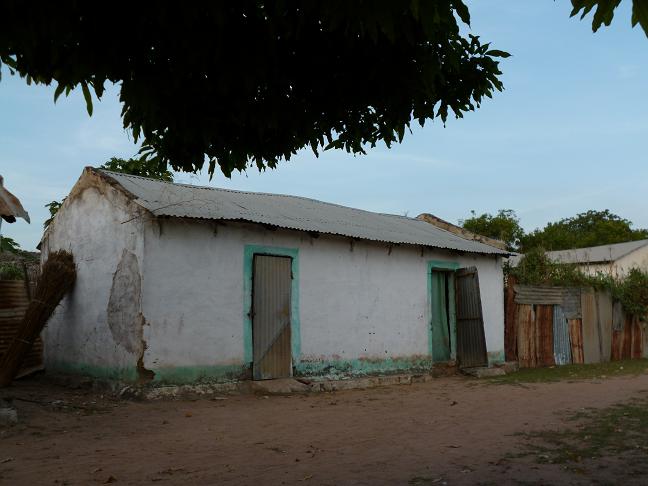
Njau Hotel #1
20.01.2013 - translated by Anne
il fait chaud
First of all today I have to make a complaint. Why nobody had forewarned me about Africa being a hot region?
Someone of you could had told me about that. I got straight, that it will be warm, but that bloody heat! I
started this morning at pleasant temperature and very good road conditions with a merry tra-la-la on my lips.
The first half of the distance I managed in 2 hours without any trouble, while hunting out a troop of monkeys
directly at the roadside. Shortly after I had passed the first larger village, the road condition changed from
an exemplarily asphalted road to an uncomfortable pothole sequence and continued shortly after as a dusty earth
road. Had I missed a junction? The vehicles on the opposite lane with license plates from Dakar (DK) covering
me in dust were to be regarded as an evidence for the right way, even though I thought I`m on the wrong way.
After a few painful kilometers an asphalt surface appeared, only for the reason to disappear again after 1
kilometer. An african mystery. That game rolled back a few times before getting perfect asphalt under the
wheels. At that time a hellish head wind had started, so that I had the feeling to be fixed to the ground. In
the so-called “winter” the Harmattan blows, a tough, dry wind arriving from the Sahara, He ironed my hair like
an overheated hairdryer. To make matters worse my skin is burning like fire and the toes of my right leg are
shortly before to inflame. That is side effect of anti-malaria-drugs, that I`ve to pop daily. Well, no worries.
It was getting hotter, at the left side of the road a Salt Lake appeared and Kaolack, my destination was
flickering on the horizon.
Fortunately I was compensated for the hardships. When you are driving in to Kaolack coming from south, a
grandiose spectacle is surprising you. At a length of 1 kilometer the main road N5 is lined with an incomparable
trinity of junkyards, backyard workshops and bus terminals. Sheet metals, rubber, screw wrenches, welding
equipments, oil-smudged mechanics and well dressed passengers mix themselves to one big ensemble. In contrast
to me Africans are always clean and tidy inface of dust and dirt. For vehicles the motto is: just yet at the
junkyard, in the next moment leaving jam-packed with passengers! However it is an illusion, that it will start
in no time. First there is hard screwing and welding. Even though Kaolack has nearly 200.000 residents, it isn`t
a conventional town, but an agglomeration of dust, sand, building waste, corrugated plates and plastic waste.
Half of the trash is “made in China” and is huckstered at the local market, which is said to be the biggest in
West Africa.
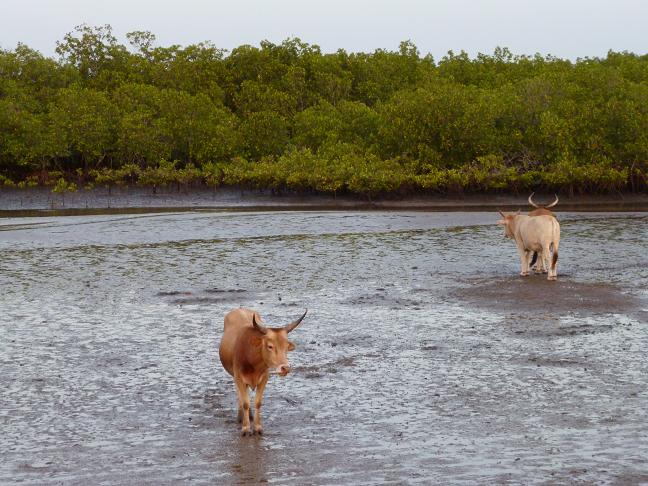
Senegalese Mud cows
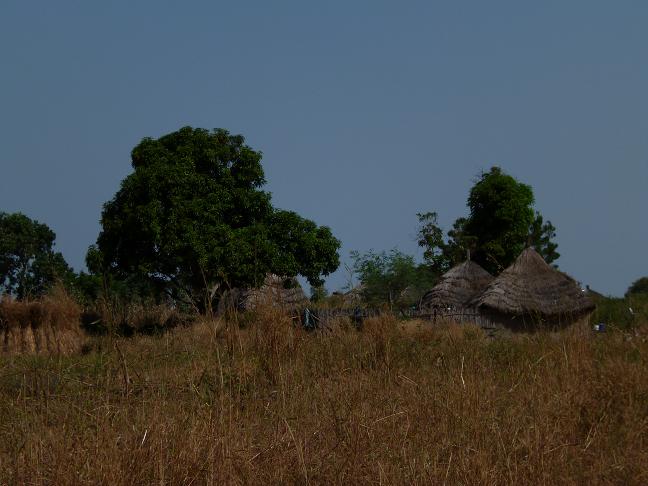
African village
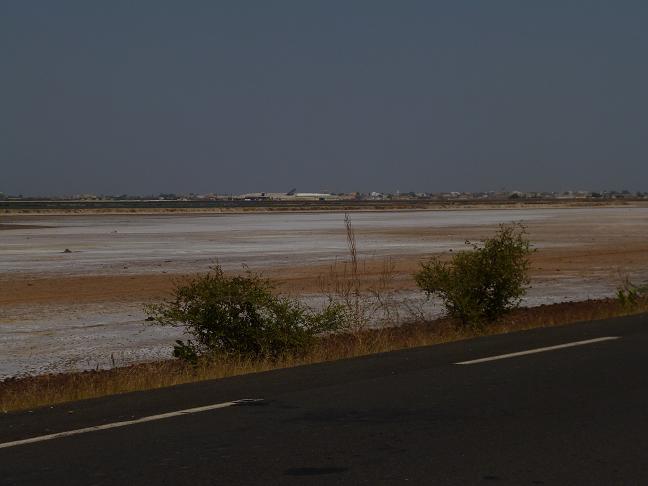
Kaolack from distant
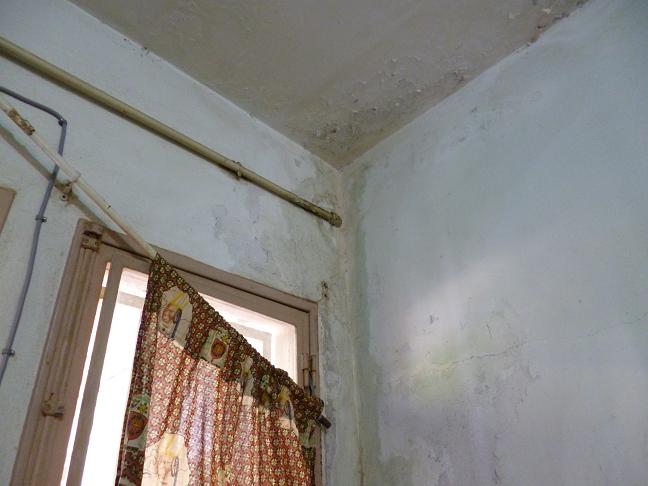
Mission Catholique
18.01.2013 - translated by Manu
wonderful africa
Gambia is small country, actually it is one one of the smallest countries in Africa. Its shape is very long but narrow, only a small strip of ground on the left and right side of the Gambia river. You have to be careful becaus if you take the wrong direction it is very easy to leave Gambia without knowing it. And this happened to me. I just pedaled with my bike and in one fell swoop I reached Senegal. But the last impression of Gambia was not very notable. In Banjul I avoided the flophouses in the near of the harbour. So I took a room in the Princess Diana Hotel, which was strongly recommended in the guidebook. Arrived in the room, I noticed that the mattress was full of bugs and other vermin. Unfotunately I noticed this too late. So it was the resut that I had to pitch my tent on the bed in the room (you can imagine that it was very hard to fasten the tent pegs in a professional way). On the end of the day it was not very comfortable. In contrast to the hard night in Banjul my second stage on bike starts very good. I cycled on a splendidly constructed road in Senegal, which was used mainly by donkey carts and tropical centpedes. Sometimes I also met a slow bush taxi. During my trip a I enjoyed the view on a wonderful african landscape. I saw baobabs, elephant grass (miscanthus), mango trees (unfortunately at the moment the mangos are not seasoned) and once in a while an archaic village with small mud huts covered with thatched roofs. The destination of my trip was Toubakouta, which is pictorial village in the Sine-Saloum-Delta. This river delta belongs to the World Heritage List, because of its mangrove forest, which are in good order and because of its huge number of animal species (especially birds). The landscape is terrific! Unfortunately the view is bothered by some luxurious villas, which are realy not in line with the great landscape. An expensive trip with a pirogue was a great experience, not at all because I had to do the trip as a single passenger because no further tourists were available.
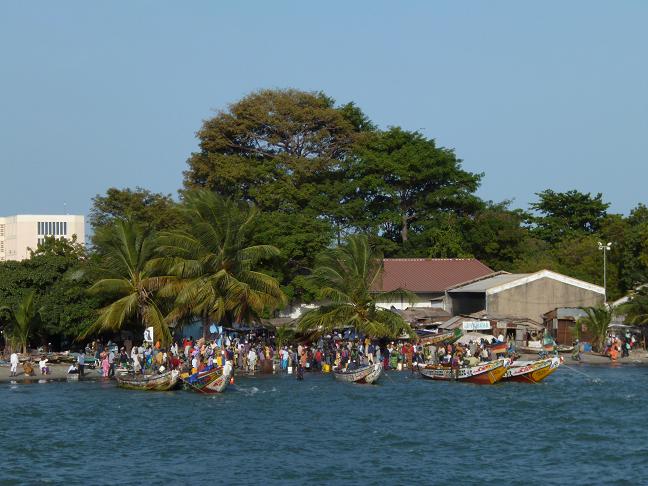
view of Banjul
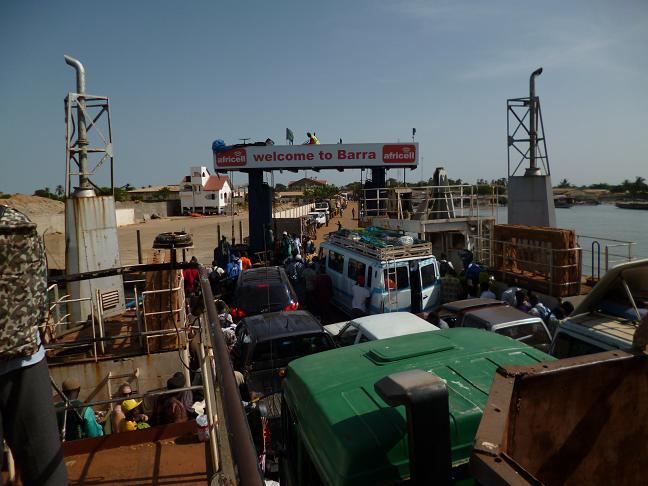
Ferry crossing the Gambia river
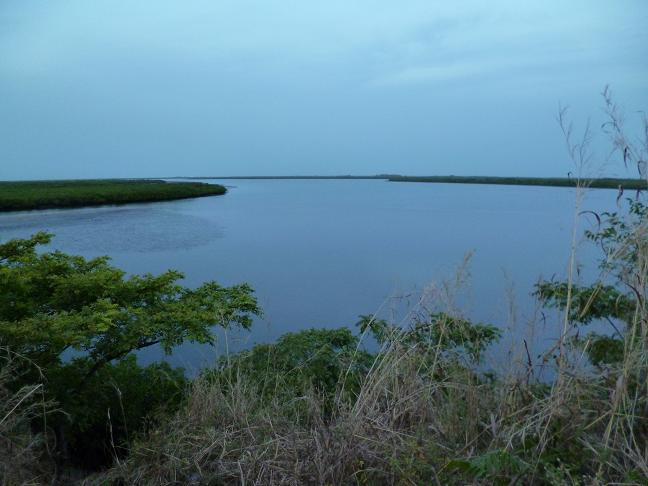
Sine-Saloum-Delta
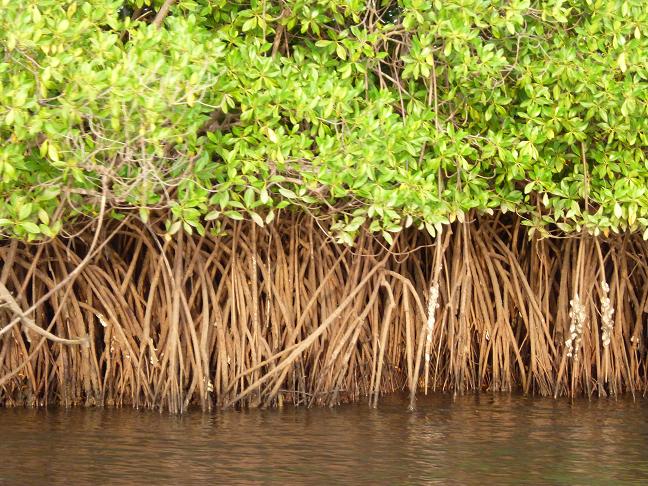
close view at mangrove forest
06.01.2013 - translated by Jörg
day life in gambia
The moon, with its underestimated power, affect’s the daily life and particularly the sensible technology in
Gambia. Internet, electricity ATM’s are working sometimes… sometimes not. Whether you have good or bad luck
is depending on the tide tables but you cannot predict. Gambians handle it with gallows humor and make up this
uncertainty with kindness and looseness, what’s not very helpful for my ambitious travel blog.
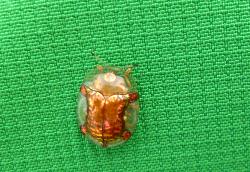 I started to hate ATM’s which are moody, touchy, chintzy and indisposed. With nine tries at seven several
ATM’s I received only one time some money. Finally one cash machine went wild. After the whole procedure,
just before the machine had to give me the bloody money, the screen starts to flash: “Please wait!” I WAITED.
Five minutes later. The screen was still flashing with the same message, I started to get nervous, pushed
the “cancel” button and the machine… The cash machine was still flashing “Please wait.” Ohhh fu… I had
written off the money already, I only wanted to have my credit card back. I pushed every available button.
“PLEASE WAIT”, Right before I wanted to give it an well-deserved kick, I got my credit card back… without
money… of course. On the top of the boldness I could read: “Thanks for banking with SF-Bank. We are proud
to serve you!”
I started to hate ATM’s which are moody, touchy, chintzy and indisposed. With nine tries at seven several
ATM’s I received only one time some money. Finally one cash machine went wild. After the whole procedure,
just before the machine had to give me the bloody money, the screen starts to flash: “Please wait!” I WAITED.
Five minutes later. The screen was still flashing with the same message, I started to get nervous, pushed
the “cancel” button and the machine… The cash machine was still flashing “Please wait.” Ohhh fu… I had
written off the money already, I only wanted to have my credit card back. I pushed every available button.
“PLEASE WAIT”, Right before I wanted to give it an well-deserved kick, I got my credit card back… without
money… of course. On the top of the boldness I could read: “Thanks for banking with SF-Bank. We are proud
to serve you!”
Following a few impressions of my first days in Gambia
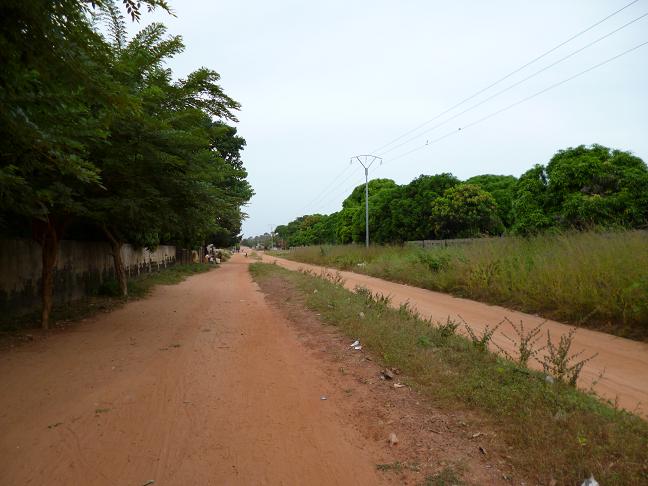
secondary road
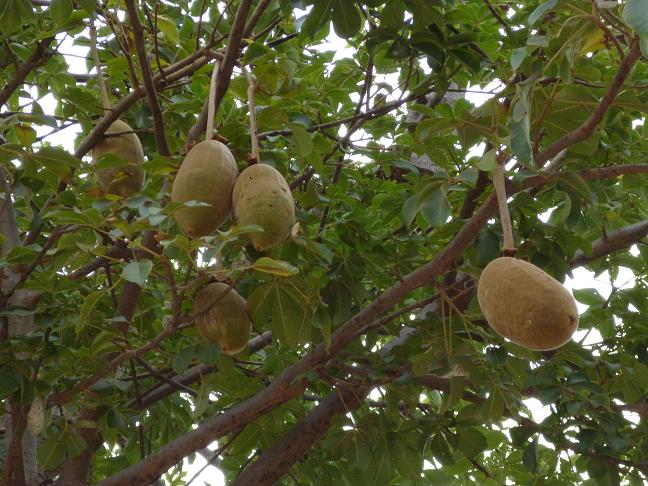
baobab with monkeys bread
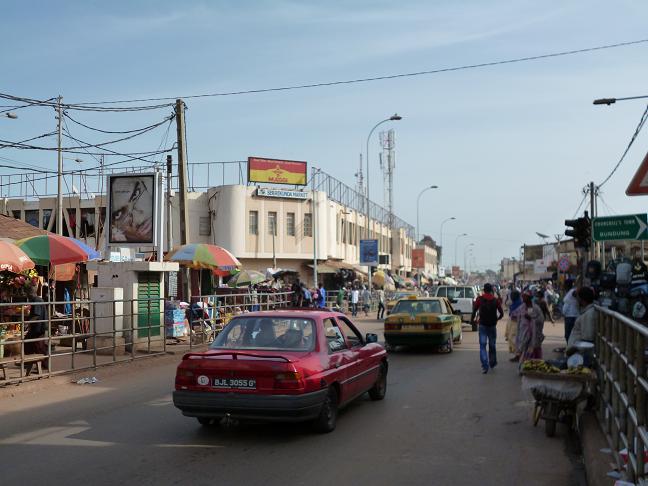
main road
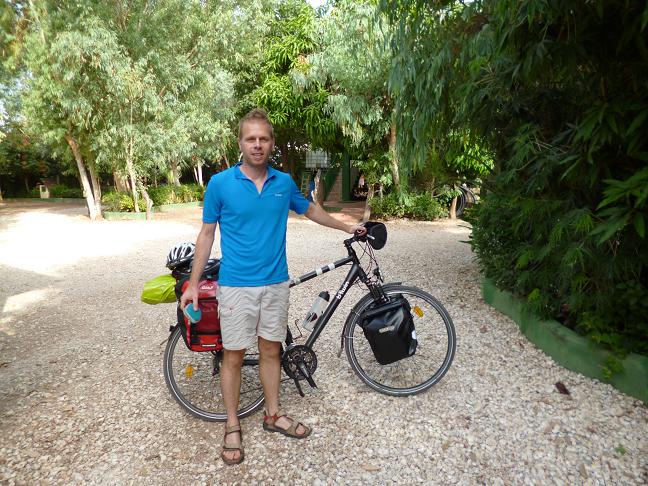
start cycling
06.01.2013 - translated by Diana
finally in africa
I am here, finally! The musty, putrid air, typical to the tropics, welcomes me in the Banjul airport.
Right now, it's pitch dark here and the weather is a soaring 30 ° C with 99% humidity. Certainly, it's
better than the usual German weather in November. In the baggage claim, I am eagerly awaiting my bike,
the packing of which very nearly failed the day before. A little detour to the day before... From a
local bicycle seller, I got a supposedly "free size" carton for free, in which the bicycle could be
packed. But despite removing the front wheel, I found that the bicycle was longer than the carton
and was not fitting in. I had to return back the carton because of this problem. After a futile hour
of measuring all the seller's remaining cartons, we found longer cartons to no avail. The man there
asked me to disassemble as far as possible and try to fit the parts in the carton. Even after removing
the front wheel, the front fender, the laboriously assembled carrier for my baggage, the complete
handle bar stem and to top it all, turning the front fork to 180 degrees, which left many spokes
dangerously twisted, the torso of the bicycle was still a few cm longer. Impossible situation! After
repeated unsuccessful measuring, I did something that was completely contrary to my school Maths and
squeezed the bicycle into the carton. The carton threatened to burst open any second! At least the
unwrapping shouldn't be difficult. Anyway, I wrapped it up with a lot of adhesive tape. Would it work?
Time could only tell.
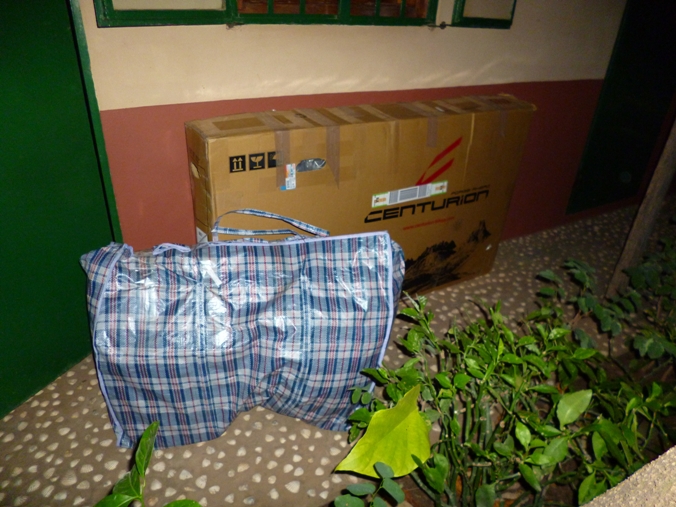 Back to the present, I see only tourist bags and not my bicycle package. Ah, now comes my baggage
and the Gambians are amazed by the size of it when I pull it out of the conveyor belt. Normally, the
Ghanaians carry yams and such like in baggage like that of mine, which are derogatorily called
"Poland Bags" or "Turkish Bags". It seems, after a brief discussion with the authorities, I can go
with my luggage. My bicycle carton has been brought to me by hand as it is deemed a special baggage.
Now the curiosity among the bystanders is growing, to know about the big baggage. A customs official
is quite animated in his inquisitiveness to examine the contents closely. The customs rule that in
Gambia all luggage are to be run through a scanner. When the scanner is just about to gulp my bicycle
carton, the official knows what's inside but shows his rigour by asking me, "What's inside?" I said,
"a bicycle". He goes, "really, I want to unwrap it and check it" I offered,"please look through the
two holes in the carton" He consents and after some trying in the dimly lit corridor, he proudly
proclaims, "It's a bicycle". Now we both are happy. I am out quickly through the customs and I have
arrived, in Africa!!! What's remaining is, for me to see and conquer!
Back to the present, I see only tourist bags and not my bicycle package. Ah, now comes my baggage
and the Gambians are amazed by the size of it when I pull it out of the conveyor belt. Normally, the
Ghanaians carry yams and such like in baggage like that of mine, which are derogatorily called
"Poland Bags" or "Turkish Bags". It seems, after a brief discussion with the authorities, I can go
with my luggage. My bicycle carton has been brought to me by hand as it is deemed a special baggage.
Now the curiosity among the bystanders is growing, to know about the big baggage. A customs official
is quite animated in his inquisitiveness to examine the contents closely. The customs rule that in
Gambia all luggage are to be run through a scanner. When the scanner is just about to gulp my bicycle
carton, the official knows what's inside but shows his rigour by asking me, "What's inside?" I said,
"a bicycle". He goes, "really, I want to unwrap it and check it" I offered,"please look through the
two holes in the carton" He consents and after some trying in the dimly lit corridor, he proudly
proclaims, "It's a bicycle". Now we both are happy. I am out quickly through the customs and I have
arrived, in Africa!!! What's remaining is, for me to see and conquer!
Following the reincarnation of my bycicle
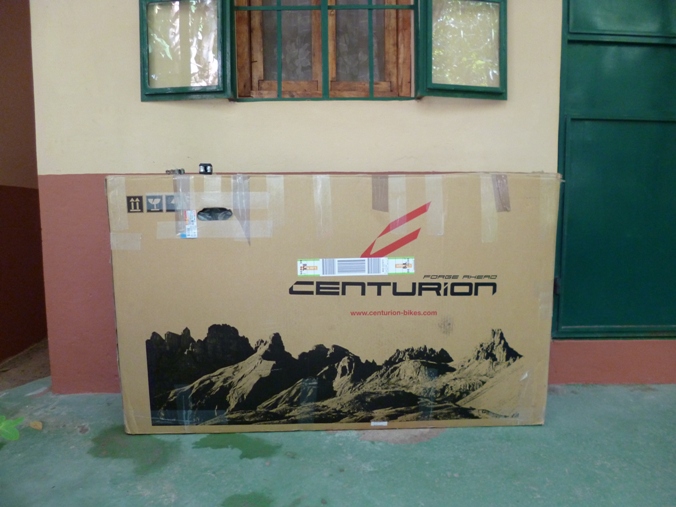
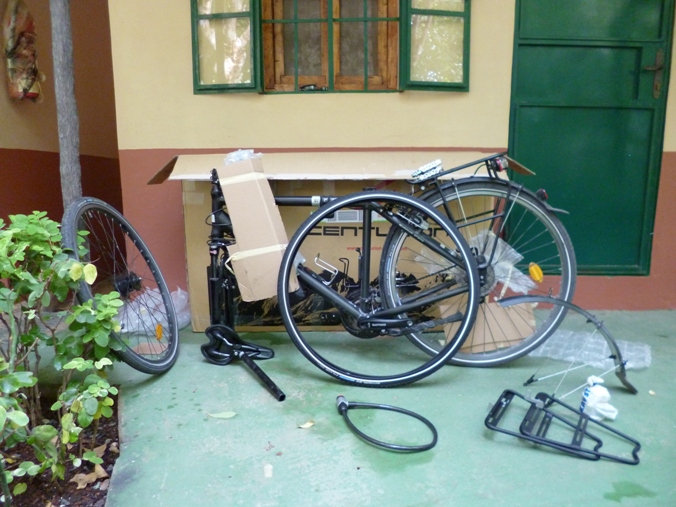
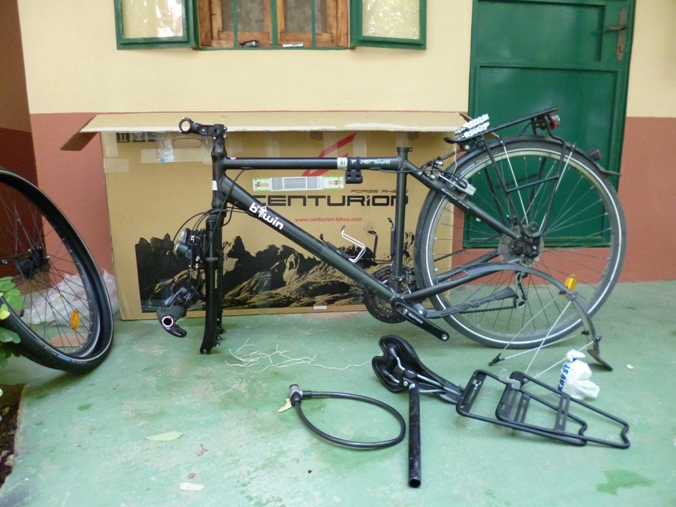
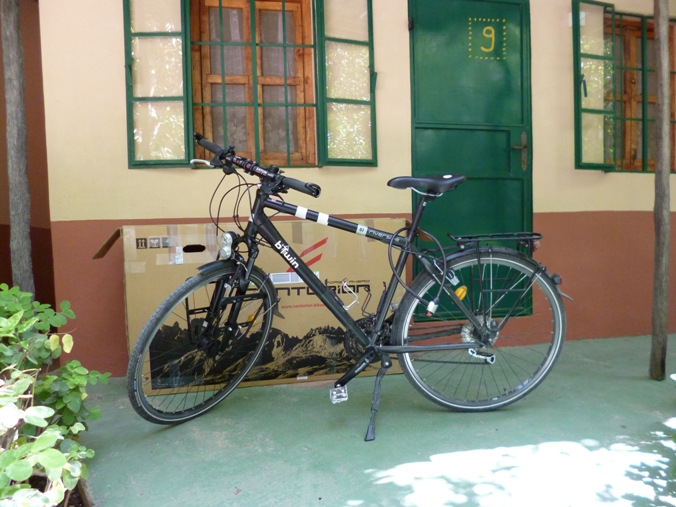
04.01.2012 - translated by Hari
preliminaries
I am on the road again. This time my destination is Westafrica. As a completely new experience I will be cycling the whole trip. This travel blog is absolutely handmade and not a prechewn instant meal flavoured with MSG. Instead I offer you a motley and indiviually designed webiste made with love and a multifaceted potpourri. If there are some technical problems, I am grateful for help or suggestions. Anyone missing a modern web standard or some kind of 2.0 has to look for something else. Since I am already busy updating the German version and struggling with the inconveniencies of Internet in Africa, some of my friends are volunteering to translate my blog entries into English. So don't wonder about varying styles.
14.12.2012

